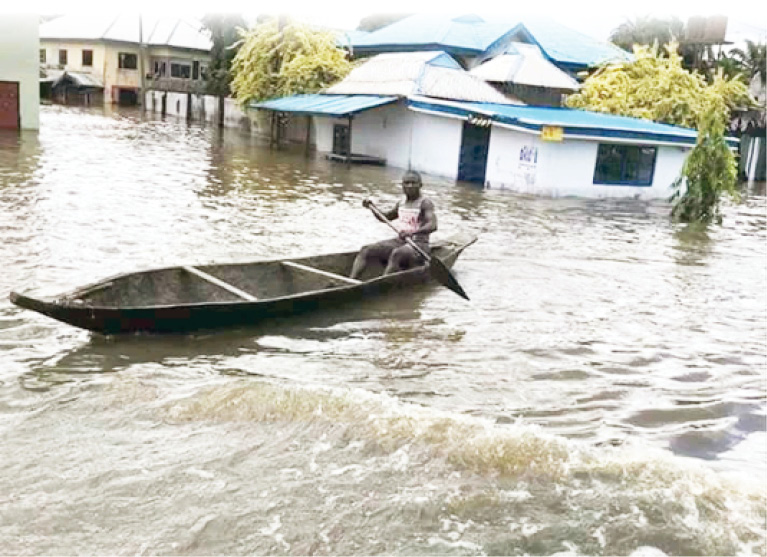In a decisive move to address the recurring nightmare of flooding that has plagued Nigeria’s most vulnerable communities, the Federal Executive Council (FEC) has approved the establishment of a groundbreaking National Disasters Relief Fund. The announcement, made on Monday, September 23, 2024, comes as a ray of hope for millions of Nigerians living in flood-prone areas, particularly in the wake of recent devastating floods that have claimed dozens of lives and displaced thousands.
The halls of the Presidential Villa in Abuja buzzed with activity as Minister of Finance and Coordinating Minister of the Economy, Wale Edun, briefed reporters following a crucial FEC meeting chaired by President Bola Tinubu. “This fund represents a paradigm shift in how we approach disaster relief in Nigeria,” Edun stated, his voice carrying a mix of determination and urgency. “It’s about ensuring that when disaster strikes, we’re not scrambling for resources – we’re ready to act swiftly and effectively.”
The new fund aims to pool resources from all three tiers of government – federal, state, and local – as well as private sector players. This collaborative approach is designed to create a robust financial safety net for flood victims and other disaster-affected populations across the nation.
In a related development, the FEC has constituted a high-level Technical Committee to reassess the country’s dams, with a particular focus on the Alau Dam in Borno State. This move comes in direct response to the recent tragedy in Maiduguri, where scores of lives were lost due to catastrophic flooding
We cannot stand idly by as our citizens suffer,” declared the Minister of Water Resources, who will chair the newly formed committee. “This comprehensive assessment will help us identify vulnerabilities and implement necessary upgrades to prevent future disasters.”
The human toll of these floods was painfully evident in the words of Aisha Muhammed, a 45-year-old resident of Maiduguri who lost her home in the recent deluge. “We’ve lived with the fear of floods for years, but nothing prepared us for this,” she said, her voice trembling. “We need more than promises – we need action to ensure our safety.”
As the government mobilizes its response, the Nigeria Hydrological Services Agency (NIHSA) has sounded a clarion call for immediate action. The agency has proposed an ambitious plan to construct five buffer dams, strategically designed to contain the annual flooding that results from water releases from the Lagdo Dam in neighboring Cameroon.
NIHSA’s Director-General, Dr. Clement Nze, didn’t mince words in his assessment of the situation. We’re in a race against time,” he stated during a press briefing in Abuja. “These buffer dams are not just infrastructure projects – they’re lifelines for communities that have lived under the constant threat of flooding for far too long.”
The agency has also issued a stark warning to residents in flood-prone areas, urging them to relocate to safer ground immediately. The list of high-risk states reads like a roll call of Nigeria’s most vulnerable regions: Adamawa, Taraba, Benue, Nasarawa, Kogi, Edo, Delta, Anambra, Bayelsa, Cross Rivers, and Rivers.
The human impact of these perennial floods is etched in the stories of those who live in constant fear of the next deluge. In Makurdi, Benue State, 58-year-old farmer Joseph Ortese shared his perspective: “Every year, we watch the waters rise, wondering if this will be the time we lose everything. It’s no way to live.”
Meanwhile, in Yenagoa, Bayelsa State, community leader Chief Ebizimor Oweifa spoke of the challenges faced by his people. “We’re resilient, but we need support,” he said. “This new fund and the proposed dams give us hope, but we’ve heard promises before. We’re cautiously optimistic.”
While the announcement of the National Disasters Relief Fund and the proposed buffer dams has been met with widespread approval, experts caution that implementation will be key. Dr. Amina Sule, a climate scientist at the University of Nigeria, Nsukka, emphasized the need for a holistic approach:
“These are positive steps, but they must be part of a broader strategy that includes improved urban planning, reforestation, and climate change mitigation efforts. We can’t simply engineer our way out of this problem.”
The financial implications of these initiatives are substantial, and questions remain about how the funds will be managed to ensure transparency and effectiveness. Economic analyst Chidi Okafor stressed the importance of accountability:
As Nigeria grapples with the dual challenges of immediate disaster relief and long-term flood prevention, the establishment of the National Disasters Relief Fund and the proposal for buffer dams mark a significant shift in the country’s approach to environmental crises. These initiatives represent a glimmer of hope for millions of Nigerians who have long lived under the shadow of annual floods.
The coming months will be crucial as the government moves from planning to implementation. The eyes of the nation will be on the FEC, NIHSA, and the various committees tasked with turning these ambitious plans into reality. For the residents of Nigeria’s floodplains, the stakes couldn’t be higher – their homes, livelihoods, and very lives hang in the balance.
As the rainy season approaches and the waters of the Lagdo Dam loom large, the race is on to build resilience and safeguard communities. The National Disasters Relief Fund and the proposed buffer dams are more than just infrastructure projects – they’re a testament to Nigeria’s commitment to protecting its most vulnerable citizens and building a more secure future in the face of environmental challenges.



